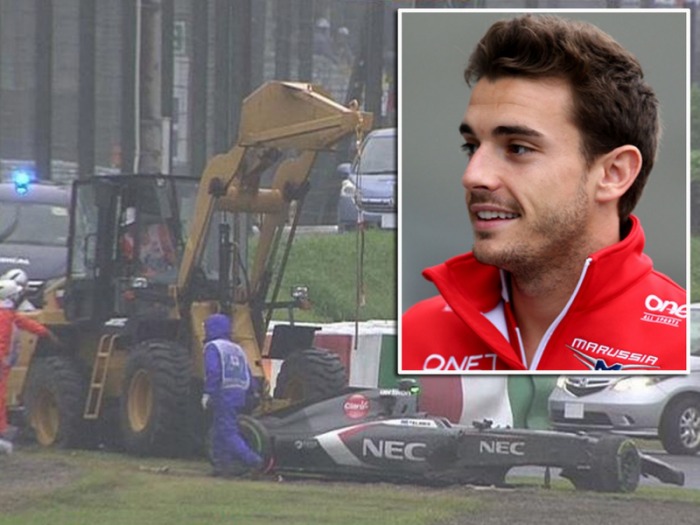Formula 1 driver Jules Bianchi passes away, first F1 death since Senna

Jules Bianchi, the 25-year-old Formula 1 driver, passed away yesterday morning after being in a coma following his freak accident at the 2014 Japanese Grand Prix 9 months ago. At that time, Bianchi raced for a backmarker team — the Ferrari-powered Marussia F1 — and was among the best from the Ferrari Driver Academy program, Scuderia Ferrari’s own driver development program.
Due to a severe typhoon during the Japanese GP, Bianchi aquaplaned on the ‘Dunlop corner’ on lap 43 at the Suzuka circuit and hit the bulldozer which was recovering the Sauber racecar of Adrian Sutil, who had spun and crashed a lap before. The collision was unfortunate as his car slid under the rear axle of the bulldozer, hitting his head against the tractor’s rear end, destroying the roll hoop that protects the driver’s head, and causing him to be unconscious immediately. As a consequence, Bianchi suffered massive head injuries and later was shifted to a hospital in Nice, France where he was treated till date.
Bianchi was hailed as a future F1 talent and was on the verge of graduating to a mid-field F1 team in 2015. His career-best finish was 9th at the 2014 Monaco GP, where he achieved that result with some raw pace and talent. Referring to this race, double world F1 champion, Fernando Alonso hailed Bianchi’s driving as a ‘miracle’ in a non-competitive car.
I once had the chance to meet him during the 2013 Abu Dhabi GP weekend where he was giving some valuable karting tips to a kid while the rest of the crowd was busy running behind Sebastian Vettel for autographs.
If Bianchi were alive and racing today in 2015, he would be mentioned in the same breath as Max Verstappen, Felipe Nasr and Valtteri Bottas as the future stars of Formula 1.
It was the first fatality since Ayrton Senna’s death two decades ago. Following Bianchi’s accident, the FIA introduced a ‘Virtual Safety Car’ system whereby drivers are obliged to slow down to a ‘safe speed’ as displayed on the steering wheel till the incident is cleared or the release of an actual safety car is required.

Comments
Sahil
You didn’t really have to meet him to write this. What’s the takeaway from the supposed meeting? “I once had the chance to meet him during the 2013 Abu Dhabi GP weekend where he was giving some valuable karting tips to a kid while the rest of the crowd was busy running behind Sebastian Vettel for autographs.” ?
The rest of the info is nothing new and available across bbc, Reuters etc… I could’ve just stood there and watched him talk to a kid and written this. As couldve hundreds of people who were presumably there. I was expecting something that’s not already widely out there… Just shocking “journalism”!
Mashfique Hussain Chowdhury
Coverage of a news item in more than one media? Shocking!!!
Ahmed K
Drive arabia never cover F1 news so I think it is good they let a F1 fan cover this news.
Utk
@Sahil: This article was more about the news of Bianchi’s passing away than of the fact that Shijil met him, which was covered in a single sentence. And of course there must have been a takeaway, even if it was something not so significant. I believe that Shijil was instead trying to display admiration by showing how nice Bianchi was as a person, and trying to give the article a personal touch, which always improves an article.
On your comment about the rest of the info: That is just ignorant, rude, extraneous and expendable criticism. What “something that’s not already widely out there” were you expecting? All disclosed information is public, and nobody is authorized to speak about undisclosed information.
IMO, this is a short, yet well-researched and well written article.
—
RIP Jules.
Shijil Hashim
I did have a chance to have a casual chat with him, how hard core F1 fans like me have observed his performance compared to his team mate over race weekends and how one day we can hopefully seem him as a Ferrari racer. Point is, myself being a usual spectator in the Paddock Club area, not a media person who can take interviews, we are limited to casual talks not detailed interviews.
There were few kids around who are doing part-time karting along with their studies; some of them had even travelled across to see the race with their parents, looking to talk with these drivers to get their tips and advice. I tried to convey in the article that Bianchi was a humble person, always calm and never ignored someone who approached him. He met this boy and gave him some advice on karting and his racing career, which other drivers don’t seems to do it, probably since they have so much happening around them during race weekends. I was around him that time, heard his advice to the boy and his dad and later just had a quick chat and handshake.
I’ve tried to summarize Bianchi’s main achievements, accolades he gained from top drivers like Alonso and what caused his death rather than an interview. You have to remember that this is a live memory I have of him I wanted to share, rather than a full-fledged face-to-face interview which going by the comments, some of you might have expected.
Alton
Sad to see this. Don’t follow F1 but racing death is always sad. Nice you take notice of him when he was not famous.